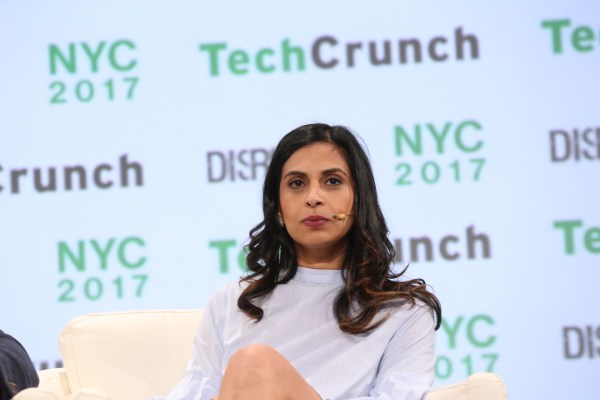It has been nearly a decade since Anu Duggal, founding partner of Female Founders Fund, started raising money to invest in women-led startups. In 2020, the investor says her thesis — that there will be a generation of successful venture-backed businesses built by women — is one you can’t avoid.
“You can’t argue with that anymore,” she said. “There are going to be some people who take a little longer to kind of accept that this is a long-term development, and there’s some that have recognized this is the future.”
We brought Duggal on to Extra Crunch Live on Thursday to discuss how her work is changing amid unprecedented times.
She, like many investors, says she has taken on the “new normal as the new normal” and is invested in startups without ever meeting founders in-person. But how does the breakdown of traditional networks impact female founders?
“I wouldn’t say we’re seeing new tailwinds yet,” she said, on the focus to invest in female founders. “I think we’re still kind of in the early innings of corona. I will say, though, that there’s reason to be optimistic.”
Duggal talks about bright spots in this dumpster fire of a year, scout programs and the “lipstick effect” in the full session, which is available below. You can sign up for Extra Crunch here if you still need access.
Should investors publicly share portfolio diversity data?
We felt strongly about disclosing diversity data because, you know, we invest 100% in companies started by women and so we’re already at somewhat of an advantage compared to most of the industry. I think the reason we did it was to show that we’re not patting ourselves on the back. We still have more work to do. And here’s what we’re going to do, here are the action steps we’re taking.
So yes, I think it would be great for other funds to follow suit. But that felt right for us. So I hesitate being prescriptive for others in the industry.
I think the idea is that every year we want to make progress. So if we started at one number, we want to show that every year where we’re making progress from the point at which we started.
How to navigate starting a gender-focused fund
I view anyone who wants to invest as an entrepreneur. My advice is always if you’re going to build something, you have to be really passionate about it.
And so in the same way, if someone was building a healthcare fund or a fund focused on AI, I would advise them that you’re going to invest a lot in this venture, right? So the way that you think about kind of your founding story and why you’re building this has to be very transparent and has to be very authentic.
Don’t start that fund because you think that that’s what investors want to hear. Start it because that’s what you care about. So my advice generally is if you’re passionate about investing in people of color, then you should start a fund with that focus. If you’re passionate about AI, start a fund with that focus. I think that you should build something that there is a real story to why you’re building it.
How important is it to be externally loud and proud about supporting diverse founders?
I don’t think it has to be in your name. I think that you can choose to be kind of externally facing in other ways, you know, you can write about it, you can tweet about it. It just depends on your level of comfort.
Which sectors are standing out amid COVID-19?
Obviously, digital health. There’s never been a more pressing need to provide better access to healthcare. And digital solutions are doing very well. Number two, I would say beauty. We use the term called the “lipstick effect.” Economists coined this term during the Great Depression when women during recessionary periods, if they couldn’t buy handbags or clothing, they would buy makeup, skincare or personal care. It’s because it was an affordable luxury. And it made them feel good. And so within our portfolio, the beauty brands have definitely seen some pretty interesting growth.
